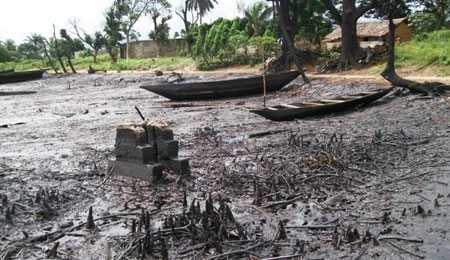-
Tips for becoming a good boxer - November 6, 2020
-
7 expert tips for making your hens night a memorable one - November 6, 2020
-
5 reasons to host your Christmas party on a cruise boat - November 6, 2020
-
What to do when you’re charged with a crime - November 6, 2020
-
Should you get one or multiple dogs? Here’s all you need to know - November 3, 2020
-
A Guide: How to Build Your Very Own Magic Mirror - February 14, 2019
-
Our Top Inspirational Baseball Stars - November 24, 2018
-
Five Tech Tools That Will Help You Turn Your Blog into a Business - November 24, 2018
-
How to Indulge on Vacation without Expanding Your Waist - November 9, 2018
-
5 Strategies for Businesses to Appeal to Today’s Increasingly Mobile-Crazed Customers - November 9, 2018
Hold Shell accountable for oil spills, AI tells FG
Amnesty says Shell Nigeria does not use the same standards as its European parent company.
Advertisement
In a report detailing the accuracy of clean-up claims by Anglo-Dutch Shell, Amnesty worldwide and a local nonprofit group Centre for Environment, Human Rights and Development (CEHRD) said their researchers found that polluted sites remained as they were prior to the release in 2011 of the United Nations Environmental Programme (UNEP) report which berated the oil firm and the Nigerian government for not cleaning up oil spills and negligence.
Investigations into four oil spill sites identified in the UNEP report demonstrate that they “remain visibly contaminated” because of an “inadequate clean-up”, according to Amnesty.
At one of the locations, Shell’s Bomu Well 11, researchers found blackened soil and layers of oil on the water, 45 years after an oil spill took place – even though Shell claims to have cleaned it up twice, in 1975 and 2012.
“We disagree with the assertions made with regard to implementation… and would like to reiterate that we have consistently and publicly reported our actions in this regard as well as highlighted ongoing challenges of crude oil theft and illegal refining”, the SPDC said. “The investigation shows Shell has not addressed problems with its entire approach to cleaning up oil pollution in Nigeria”. The environmental clean up of the Niger Delta, the biggest oil-producing region in Africa, is long overdue, Kamara told DW.
The charity timed the launch of its new report to mark the 20th anniversary of the execution by the Nigerian government of nine Ogoni tribal leaders who had campaigned against oil extraction on their territory.
“By inadequately cleaning up the pollution from its pipelines and wells, Shell is leaving thousands of women, men and children exposed to contaminated land, water and air, in a few cases for years or even decades”, said Mark Dummett, Business and Human Rights researcher at Amnesty.
It went on to accuse Nigeria’s government, the majority owner in Shell Nigeria, of an “almost complete failure” to regulate the industry and protect people’s rights. “For many people of the region, oil has brought nothing but misery”, said Stevyn Obodoekwe, CEHRD’s Director of Programmes.
But the ageing 50-year-old pipes and rusty pumps have burst and spilt large quantities of oil at least seven times since 1990, and in 2009 a fire broke out lasting 36 hours, leading to another major spill.
Amnesty recommended Nigeria’s government strengthen and increase NOSDRA’s capacity and budget and audit how the regulator certified the spill sites as clean.
Advertisement
“Shell (is) putting (its) reputation on the table that warrants the cargo is NOT stolen and this should remove any concerns ship-owners have around bad title down the oil chain”, the company said at the time. “It becomes hard for them to compel these companies to do what they need to do for the environmental clean-up”. The rights group also said Shell should carry out effective clean-up and remediation operations at Bomu Manifold, Barabeedom swamp, Okuluebu and Boobanade, and pay all affected communities adequate compensation.





























